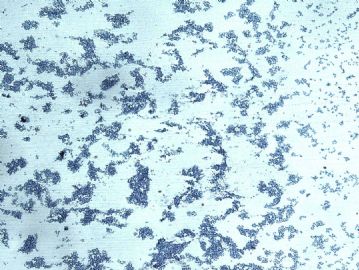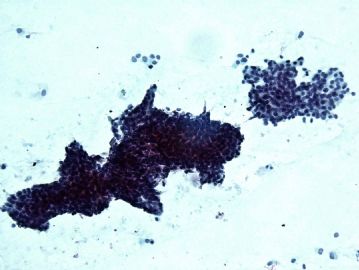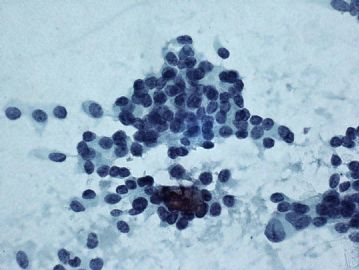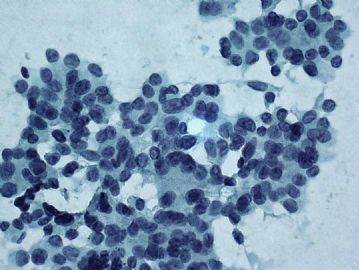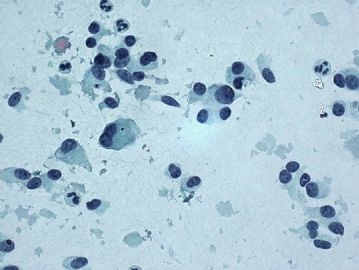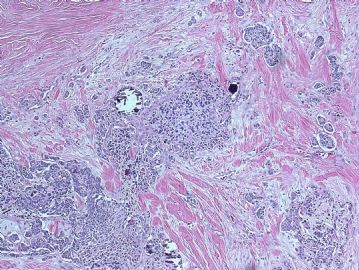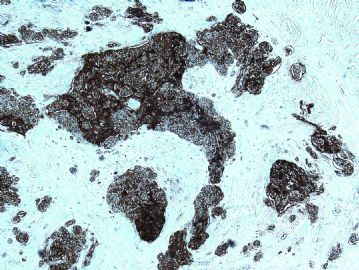| 图片: | |
|---|---|
| 名称: | |
| 描述: | |
- Thyroid FNA
-
OK. It seems that the predominant opinion is papillary thyroid carcinoma. That was my first impression. But my fellow raised another differential diagnosis, which I think is very good. Pay attention to photo no. 5, yes, someone did ask me what are those cells, I need to ask you guys to have more discussion.
-
简翻译如下:This case was signed out by one of our pathologists as "Thyroid neoplasm, favor papillary thyroid carcinoma", then the clinician called her and mentioned the high serum Calcitonin.本例由一位病理医师签发的病理报告为甲状腺肿瘤,可能是乳头状癌。临床医生打电话说病人的血清降钙素高, Then the pathologist did a cell block and did immunostains for CEA and calcitonin and amended the report to "thyroid neoplasm, favor medullary carcinoma".然后病理医生又用了细胞块做免疫组化显示:CEA和降钙素阳性,由道欠,重新发的病理报告:甲状腺肿瘤,可能是髓样癌。 I learned a great deal from this case.因为有这样的病史,我认真复习了本例。 Medullary thyroid carcinoma has a nickname "melanoma of the thyroid",髓样癌又平被戏称为甲状腺的恶黑, because it can mimic many thyroid neoplasm. 因为它的形态可以类似于许多的其它肿瘤。The general rule I learned from my cytopathology fellowship is that if a thyroid neoplasm looks not perfect for papillary carcinoma, follicular neoplasm, or Hurthle cell neoplasm, think about medullary carcinoma.我从细胞同行那学习的经验是这样的,如果一个甲状腺肿瘤不完全象乳头癌,不完全象滤泡性肿瘤,也不完全象嗜酸细胞性肿瘤,这个时候,可能就是髓样癌。
This case was signed out by one of our pathologists as "Thyroid neoplasm, favor papillary thyroid carcinoma", then the clinician called her and mentioned the high serum Calcitonin. Then the pathologist did a cell block and did immunostains for CEA and calcitonin and amended the report to "thyroid neoplasm, favor medullary carcinoma".
I learned a great deal from this case. Medullary thyroid carcinoma has a nickname "melanoma of the thyroid", because it can mimic many thyroid neoplasm. The general rule I learned from my cytopathology fellowship is that if a thyroid neoplasm looks not perfect for papillary carcinoma, follicular neoplasm, or Hurthle cell neoplasm, think about medullary carcinoma.
Now, I list a good table of differential diagnosis of papillary carcinoma (PTC) vs. medullary carcinoma (MTC) from Dr. Kini's book of thyroid FNA
MTC PTC
Cellularity Highly cellular Highly cellular
Cells Cells mostly in dispersed pattern Cells mostly in groups, syncytial
rarely in syncytial pattern pattern, rarely dispersed pattern
Nucleus Eccentric, salt- and -pepper chromatin Eccentric to central, can have salt
binucleation frequent, nuclear pseudo- -pepper chromatin, binucleation
inclusion can be seen Not a feature, pseudo-inclusion
is always seen
Cytoplasm Scant to variable, pale to dense Variable, pale clear or vacuolated
Background Colloid absent, amyloid present can have colloid, amyloid absent
Immunoprofile Calcitonin +, Thyroglobulin - Calcitonin-, thyroglobulin +
Hopefully this discussion will be interesting to you
Thank you so much 月新 for the translation. Just to follow-up on this case. the patient had surgery last Friday and I have the surgical pathology. It is medullary carcinoma, but has some unusual features, like psammoma bodies and focal follicular differentiation. I am posting one photo of the histology and one photo of the immunostain for calcitonin.
This case also raises the possibility of a combined papillary and medullary carcinoma, but the thyroglobulin stain is completely negative. Thus, at the end, I feel it is better to classify the whole tumor as medullary carcinoma.
Hope this case illustrates that medullary carcinoma can have many "faces".
